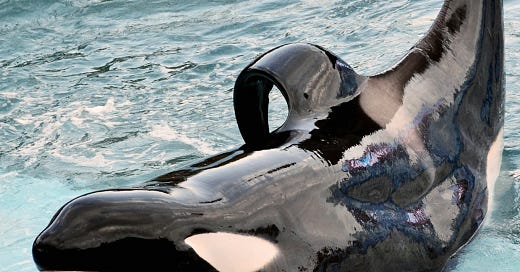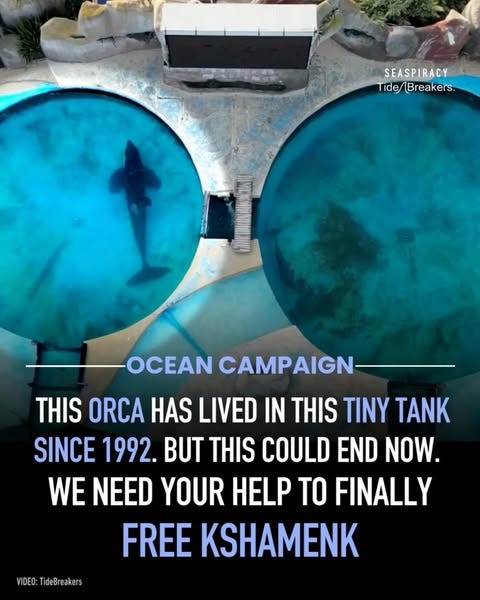Free Kshamenk,the world's loneliest orca
Three decades in captivity. One last chance at freedom.
The sound of the waves has been replaced by concrete walls, chlorine, and the hum of water filtration systems for cetaceans worlwide, including Kshamenk.
Scroll down to read the full story.
The captivity crisis: Kshamenk and the cost of confinement
Once, he swam the open ocean.
Now, he circles a tank in Buenos Aires. Alone. For over two decades.
Kshamenk is the last captive orca in South America. Kept in a chlorinated tank at Mundo Marino, a rundown marine park in Argentina, he is isolated not just from his pod, but from everything wild. Everything real.
He performs for tourists. He floats listlessly. He survives.
But surviving is not the same as living.
A history written in scars
They say Kshamenk was “rescued” after stranding in 1992. But few believe that story. Eyewitnesses say he was forced from his family, captured under the guise of rehabilitation and never released. Argentina prohibits the commercial capture of wild orcas. But a rescue? That’s legal.
So they called it a rescue. They called it care. They called it conservation.
What they didn’t call it was what it truly became: permanent captivity. An unending sentence.
And now, more than 30 years later, Kshamenk circles the same tank. Alone. His only companion died in 2000. He hasn't heard the voice of his own kind since.
Orcas are not meant to be alone
In the wild, orcas are matrilineal. They travel with families for life. They communicate through dialects. They hunt cooperatively.
In captivity, they pace. They chew concrete. They grind their teeth down to the nerves.
They float motionless. They die young.
And still, the show goes on.
But the truth is visible in Kshamenk’s dorsal fin, collapsed from years of unnatural stillness. It’s audible in his silence. It’s measurable in his lifespan, diminished by decades. It’s undeniable in his eyes.
This isn’t just a tragedy. It’s a warning.
Orca captivity signals a moral imbalance, our disconnection from nature and our willingness to commodify sentient life.
We call it entertainment. But it’s cruelty disguised as spectacle.
We call it education. But it teaches only that power justifies captivity.
And while Kshamenk swims in endless circles, the ocean he once called home is changing. Warming, acidifying, emptying of fish, filled with noise and runoff and dead zones.
Would he even recognize it now?
The fight to free him
Our campaign is not just about one animal. It’s about reckoning with an entire era of ecological and ethical failure. It’s about ending the lie that orcas can thrive in tanks. It’s about honoring the life we stole.
We are calling for Kshamenk’s release to a seaside sanctuary—specifically designed for him and the dolphin he has bonded with. A protected ocean enclosure, offering a semi-wild setting, where he can feel the tide again, taste saltwater not tainted with bleach, and perhaps, for the first time in decades, choose where to go.
He can’t be released into the open ocean, but his living conditions can, and must, be radically improved. The battle is now in the courts, and several organizations stand ready to build a sanctuary the moment the government orders a change in his status.
Because freedom is not just a place. It’s the ability to choose.
And for Kshamenk, that choice is long overdue.
What you can do
Take action: Send these 6 emails we have pre-written to all the needed bodies.
Reject marine parks: Never support facilities that confine cetaceans.
Support seaside sanctuaries: Help us fund and build safe, controlled ocean environments where captive whales can recover.
Raise your voice: Contact Argentine officials. Pressure Mundo Marino. Share Kshamenk’s story.
Educate others: Teach your community the truth behind orca captivity.
The ocean has thresholds. So do we.
When we cage its apex beings for profit, we cage something inside ourselves, too: our empathy, our sense of connection, our understanding of freedom.
But we can still reverse this. We can still do the right thing.
Let this not be the story of the last captive orca in South America.
Let it be the story of the first one freed.
Stay loud, stay informed, stay active.








